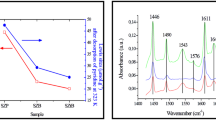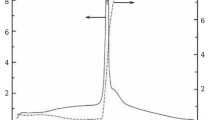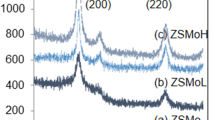Abstract
The gases evolved during activation of a sulfated zirconia prepared by impregnation with chloroplatinic acid have been followed using mass spectrometry and infrared spectrometry. When the sample is heated in either helium or in air, the halogen is lost from the catalyst as HCl and Cl2. Heating the sample in hydrogen results in the loss of the halogen as HCl, and only traces as Cl2. The loss of halogen occurs over a wide temperature range (200-900°C). The data are consistent with the chloroplatinic acid being converted by loss of halide with the formation of Pt0.
Similar content being viewed by others
Rights and permissions
About this article
Cite this article
Bi, M., Pan, WP., Lloyd, W.G. et al. Platinum sulfated zirconia catalysts. Fate of chlorine during activation. Catalysis Letters 50, 187–191 (1998). https://doi.org/10.1023/A:1019099909793
Issue Date:
DOI: https://doi.org/10.1023/A:1019099909793




